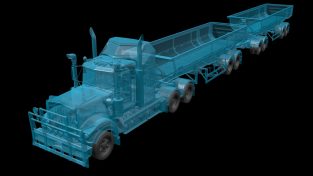Louise Daw, Innovation & Strategy Advisor for Hexagon’s Mining division, has never had to look far for a mentor. Her grandmother, June Craig, has dedicated her life to humanitarian efforts and was only the second woman in Western Australia to serve as a government minister. Daw and Craig discuss professional and personal achievements and what it takes to champion diversity and inclusion in the workplace.
NJ: Thanks for tuning in to Mining Matters. Hi, I’m Neville Judd from HxGN Radio. Joining me today are Louise Daw and June Craig. Louise Daw is a former Western Australia entrepreneur of the year and co-founded a successful mining technology company before joining Hexagon in 2017. June Craig has spent the better part of a century committed to public service and humanitarian issues. Her interest in migrant welfare led to the establishment of a Citizens Advice Bureau in regional Western Australia. She was only the second woman in Western Australia to serve as a government minister during nine years in Parliament, when she was the only serving woman. For almost a decade media described June Craig as the most powerful woman in the state. June was recognised with an order of Australia in 1994, and she just happens to be Louise Daw’s grandmother. Both women join us today to discuss their achievements, the adversity encountered en route, and what it takes to champion diversity and inclusion in the workplace. June and Louise, thank you for joining us.
Both: Thank you. We’re delighted to join you. Nev, thank you.
NJ: That’s wonderful, thanks.
I’d like to start with you, Louise. If you could tell us a little bit about your career in mining and technology and June’s influence along the way.
LD: Sure. I think it’s difficult to live in Western Australia and not get involved in mining because it is such a dominant industry here. The technology part came about by accident. I had great aspirations to become an accountant at university and it was only doing one of the courses that we had to do in order to graduate was a computer programming course and it infuriated me, it challenged me, and at the end of the semester, I got top marks for it and I realised that I love being challenged, and so I changed my degree so that I could work in the technology space.
So, taking that background with a technology degree from Curtin University and then mining was so dominant here, I worked through different businesses, lots of startups in Western Australia, until starting my own with my husband, Rob Daw, and we went about trying to digitise parts of the mining industry that had previously been overlooked or just considered too difficult to digitise.
And if I relay that back to the influence from my gran, she’s obviously been a role model my whole life about that your skills and capability are what define who you are and not your gender. So, you know, the fact that it was male dominated, it was never really a concern to me.
NJ: So, June, Louise tells me that your life motto is dedicated to humanity, and I’m interested to know what or who set you on that path.
JC: In life, there are coincidences. And it just happened that I went to Perth to have my three children with me for a couple of years instead of their being at boarding school. While I was in Perth, I could do a course with Good Neighbor Council that related to migrants. And so, it just happened by chance that I could then go back and have the opportunity to establish a Good Neighbor Council come Citizens Advice Bureau. But I couldn’t ever call it a business. I operated from a room that was about as big as a cupboard. I had it furnished from what was in my basement. And I had $300, and that was all.
LD: In fact, you call that an entrepreneur these days.
NJ: Yes. True.
JC: I suppose. So, it was very small beginnings, but it was—and really it was the people I met through that. But the people I would never have met otherwise as a farmer’s wife. So, I had an ability to equate to those people, and I knew that when it came to an election, if I could possibly be a candidate that was accepted that I could get the numbers. And so, that’s another story, but that’s how it all opened up for me.
NJ: Did you have mentors along the way that inspired you to this?
JC: No. I only had people who thought I was mad.
NJ: Well, that must reveal something about your character then, because obviously you were a rebellious spirit.
LD: I could imagine it was quite the opposite of having mentors, and quite isolating as you door-knocked and tried to raise money and raise awareness, and people asked you why your husband wasn’t being fed dinner.
JC: That’s right. Exactly. That was the one question. And, “what happened to your husband?” they would say when I knocked on doors. I’d say, “he’s all looked after.” And, “where are your children?” Well, they’ve all grown up. Oh. And so, it went on.
I’d have to say that being elected as the only woman in the West Australian parliament. It was, well, first of all, it was extraordinary for me to be able to be the endorsed candidate because I did have to stand against 11 men. And so, I guess that was my first opportunity to say, here, I’m going to have the opportunity to show you I can do it as well. But beware, I believe I could do it better. And so, that was when I started door-knocking for nearly three months, which I have to tell you was not an easy occupation.
And then, I was elected. And, you know, I have to tell you, I had never even been to Parliament House at that stage. And so, you know, it was something of which I was, I would have to say, I was proud of and still a lot of people thought I was mad, but it didn’t matter. And I managed to survive there for nine years.
LD: The second female in WA history, but the only female at the time.
NJ: Right.
LD: Yes. We got a lot of attention.
JC: Yes, we did.
NJ: Louise, it’s no secret that women are poorly represented among science, technology, engineering, and mathematics, otherwise known as STEM, either as graduates or in the workplace. What are some of the ways you think that more women can be attracted to STEM careers?
LD: So, in mining and in STEM, in particular, based-subjects, it’s about working with foundations that focus on promoting women in technology, getting different aged women from different STEM careers into the schools, talking to them, mentoring them, showcasing them. I mean, Gran is still quite actively involved with one of the schools here. And she was just telling me about how they do massive STEM programmes for the girls’ schools from year five onwards. So, it’s just about making it more accessible and just following the slogan of WITWA, Women in Technology Western Australia, use. They say if you can see her, you can be her.
NJ: What do you think companies like Hexagon can be doing towards diversity and inclusivity?
LD: I think Hexagon is doing a great job at the moment because they’re engaged regionally. We have foundations that do promote STEM and females in STEM-based roles. So, I think that we continue to support and help those regional communities and foundations that are trying to get to that roots level and to open up our doors and let people come in and see what type of work that we do. You know, showcase all the amazing technology that we develop and really just let them know that these careers are entirely possible for anyone.
JC: Yes. I think that in order to make the girls at school, I can only talk girls because I’m involved with a girls’ school, an all-girls school, it would be advantageous for all of the students if the people who came to speak to them about STEM, if you like, were people that they could relate to. In other words, I think it needs to be a younger speaker who is already achieving and can get them to aspire to do the same thing and not believe that it’s only old people who have managed to do that, because very often a speaker will be a person who’s retired and very difficult for the girls to relate to that.
LD: They’re quite senior in the company.
JC: Yes. So, you know, someone is as attractive and nippy as my granddaughter is, it would be a great advantage on the platform. Could I say so?
NJ: You just did, yeah. Actually, it makes me think. I’m curious to know, Lou, when you talk to girls—I mean, some girls might think that a career might be, have to be at the expense of family or children. Do they know that you’re—you’re a mother of four children, correct?
LD: That’s correct, yes.
NJ: Is that something that you would share in a talk or a conversation or does that not generally come up?
LD: I’m very open about being a mother, and I’m always more than happy to talk about the challenges of balancing work and family life. But these days, you can achieve, as Gran’s saying, that you don’t actually have to be mature in age to make a difference in your career. So, I worked really hard in my 20’s, started a family, my 30’s, and now just ticked over into my 40’s. So, I may no longer qualify for that young age that Gran was talking about.
JC: You definitely qualify.
LD: The message really is that yes, you can do what you want, but you can’t do everything. So, what is important to you? And you know, if you’re wanting to excel in your career, then yes, you’re going to have to make sacrifices in your family at that time. But then if your family is the most important, the biggest focus for you, then make career sacrifices and then return to your career once the children have grown. Gran proved that model. Her children were all grown up before her career began.
JC: One of the greatest difficulties I faced was that I had a curiosity value. And so, I was asked to speak at a great amount of things, you know, extraordinary things. I mean, what do you think of when you’re opening a funeral parlour or the things when I was a speaker at graduation ceremonies at universities and things like that? Well, the male members hated that. They really hated that. They’d say, “But why have you been asked?” And I’d say, “Well, you better go and ask the people who asked me. I don’t know.”
LD: Jealousy.
JC: So, really, I think it was the curiosity value that people thought, “Well, we’ve always had a man speaking to us. Let’s try that dame.”
NJ: Mm-hmm.
LD: I think, Nev, one of the things that Gran does also talk about is in parliament when she’s trying to prove points or try to argue cases that it was so easy back in those days for them to just try and dismiss Gran, saying, “Well, you’re just here as a token female.” But at the end of her tenure, she received a letter from the Premier to say those people that made those statements have come to realise that you were never a token. You earned your place here and you demonstrated that every day.
NJ: Mm-hmm.
JC: That was very nice.
NJ: Right. Well, I mean, both of you in your careers are familiar with being the only female in the room. I’m interested in finding out what helps or what helped you to be successful in male-dominated professions.
LD: Do you know, Nev, I never … I just was so passionate about what I was doing and I enjoyed it so much that it never really occurred to me that I was a handful of girls graduating from my degree, that I was often the only female employee in the technology divisions of the companies. It just did not occur to me because that’s not what I was there for. Like the girls versus boys. It’s the skills, the people that I could learn from, the mentors, you know, it was my education and my experience. And so, I think that you’re getting yourself at a disadvantage if you’re considering your gender in a career. You’ve got to think about what you enjoy about that career, what experience you want to gain from it, what skills you can bring to the table and what achievements you want from that career. And then worry about everything else.
JC: Well, that’s such a good answer, I don’t know that I can add anything to it, you know, really.
LD: I don’t think that you thought about the fact that you’re a fem—I mean, you were reminded that you were a female, but it wasn’t a thought that probably crossed your mind when you decided to take on politics.
JC: The only thing I can say is that if you’re a female working with men, all men, you really need to make quite sure that you have done your homework well and that you can, well, not only stand up against them, but I think be better than them. And that’s what I strove to do.
NJ: Well, I did want to close by asking you both. It’s clear that in your lives, you’ve set goals personally and professionally. And I’m interested to know what you think the keys to achieving the goals that you’ve set have been.
JC: I think in my life, I don’t know that it was possible for me to really set goals because I did so many different things. I mean, from being a farmer’s wife to opening a bureau to being a politician and then opening a children’s clothing business and then a big chairman of a large school over a period of seven years or so. I suppose at whatever stage of life you were, the only thing you could do was do it as well as you could, but with your own stamp, not necessarily following through your predecessor. Would you agree with that, Louise?
LD: Oh, I think that that’s another great influence of Gran’s is that once you set your mind to doing something, do it well. And you know, you’ve got to oversee the adversity and the challenges to do it well. And it doesn’t always have to be one single defined achievement that you try to track. As Gran said, she’s jumped around and wanted to be a good mother and a good wife and a good businesswoman and a good politician. And I sort of followed the same principles and philosophy.
NJ: Well, I think that’s a great note to end on. Thanks, again, so much for your insight. It’s been a pleasure talking to you both.
JC: Well, thank you, Neville. I think we both enjoyed it.
LD: Yes, we did. So, thank you very much for listening to our story.
NJ: That’s great. Well, a big thank you to our guests, June Craig and Louise Daw, for joining us today.
For more information about today’s topic, visit hexagonmining.com. And to watch additional content or learn more, visit hxgnspotlight.com. Thanks for tuning in.
















